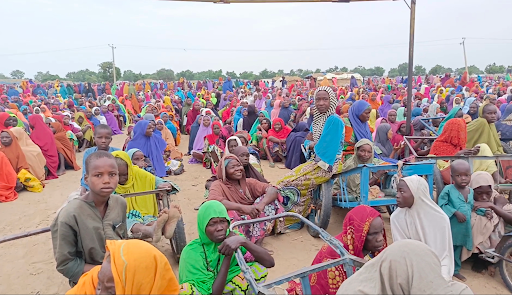42 Women Kidnapped By Boko Haram In Borno Released In Exchange For Cash, Food
Forty-two peasant women kidnapped by Boko Haram terrorists in Borno, North East Nigeria, have been released after negotiations led by government officials and the military.

A group of 42 peasant women kidnapped by Boko Haram terrorists last week have been released after intense negotiations at the weekend.
HumAngle had exclusively led in reporting that the women, all from a displacement camp in Borno state, North East Nigeria, were abducted while collecting wood in the volatile region.
The kidnappers initially demanded a ransom of ₦100,000 (about $130) for each woman, sources familiar with the incident told HumAngle.
The negotiations, led by officials from the Borno state government and the military, resulted in the kidnappers accepting a sum of ₦1 million, along with packs of rice and cooking ingredients.
The reduced ransom resulted from the government’s firm stance against encouraging ransom payments, the sources said.
Another government source, who was deeply involved in the negotiation process, revealed the women’s harrowing ordeals in captivity.
“At some point when we kept insisting on reducing the amount to be paid for each abductee, the terrorists began to flog the women whose voices we heard over the phone yelling for mercy,” said the source, a top government functionary.
“We never wanted to encourage ransom payment. That’s why we refused to give in to their demands for a huge sum,” the official explained.
The source further explained that the terrorists’ decision to target vulnerable groups like local farmers was due to the intensive military operations around the shores of Lake Chad and Sambisa forest.
“These operations had effectively blocked the terrorists’ logistics sources,” the source added.
Borno State Commissioner for Youth and Sports Development, Sainna Buba, confirmed the incident and the subsequent release of the women.
“To the glory of God, all the women have been released and since reunited with their family members,” said Buba.
“The release of the women marks a significant victory in the ongoing struggle against Boko Haram. However, the incident also underscores the continued threat posed by the group, particularly to vulnerable populations like women and children in this region,” said Aisha Adamu, a civil society activist in Borno state.
“The government’s refusal to pay the full ransom demanded by the terrorists sends a strong message against the encouragement of such criminal activities, and we are happy about that.”
Support Our Journalism
There are millions of ordinary people affected by conflict in Africa whose stories are missing in the mainstream media. HumAngle is determined to tell those challenging and under-reported stories, hoping that the people impacted by these conflicts will find the safety and security they deserve.
To ensure that we continue to provide public service coverage, we have a small favour to ask you. We want you to be part of our journalistic endeavour by contributing a token to us.
Your donation will further promote a robust, free, and independent media.
Donate HereStay Closer To The Stories That Matter




